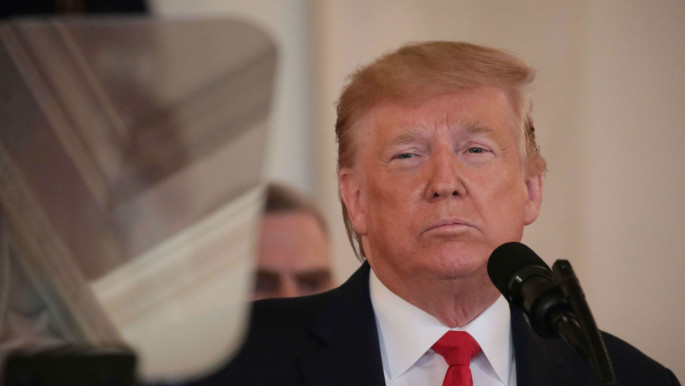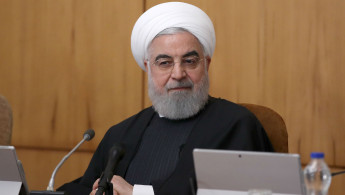Rouhani urges Iranians to unite against 'terrorist' White House
Iran should not allow US President Donald Trump's "maximum pressure" approach to harm national unity ahead of the parliamentary elections, President Hassan Rouhani said.
"We should not let Trump succeed in creating gaps between the establishment and people… We should remain united…Don't turn your back on elections. Let's have a high turn out," Rouhani said in a televised address to the nation.
"We should not let Trump and those terrorists in the White House isolate Iran."
Iran is set to have elections on 21 February as Iran's clerical rulers face challenges in keeping the economy afloat under increasing tough US sanctions imposed by Washington after it withdraw in 2018 from Tehran's nuclear deal. Oil exports have been slashed, too.
Iran's hardline Council of Guardians, which vets all election candidates has disqualified some 9,000 out of the 14,000 people who registered to run. Moderates have complained that in most cities they do not have a candidate the enter the race, Reuters reports.
|
Rouhani went on to stress the importance of the election: "This parliamentary election is a very important election… I have written letters to relevant authorities to resolve the issue of disqualifications," Rouhani warned.
"You [hardliners] claim that you will win the election. That is fine, but just let the election be a competitive one. I am calling on our nation to vote. Even if you have criticism over issues and problems, please cast your vote."
US sanctions
The US will not lift sanctions on Iran to negotiate with the Islamic Republic, Trump said over the weekend, in an apparent response to a Der Speigel interview with Iran’s foreign minister.
"Iranian Foreign Minister says Iran wants to negotiate with The United States, but wants sanctions removed. @FoxNews @OANN No Thanks!" Trump tweeted in Saturday, first in English and then in Farsi.
Iran's Foreign Minister Mohammed Javad Zarif responded to Trump's tweet on Sunday with an excerpt from the interview reaffirming Iran’s willingness to negotiate if sanctions are lifted.
"@realdonaldtrump is better advised to base his foreign policy comments & decisions on facts, rather than @FoxNews headlines or his Farsi translators," Zarif added on Twitter.
Trump appears disinclined to return to the negotiating table after tensions escalated between Tehran and Washington since the killing of Iranian commander Qasem Soleimani on 3 January.
Iran retaliated five days later by launching a wave of missiles at American troops stationed in Iraq, injuring 34 US soldiers, following a national funeral for its top commander.
 |
| Donald Trump doesn't plan to lift sanctions on Iran any time soon [Getty] |
Trump first reported that there were no casualties, and after the Pentagon announced 34 US service members have been diagnosed with traumatic brain injuries resulting from the Iranian missile attack the US president responded: "I heard they had headaches. No, I don't consider them very serious injuries, relative to other injuries that I've seen."
On Saturday, Iran condemned what it called the "illegal and inhumane treatment" of its citizens by US border security officers after reports an Iranian student was deported despite having a valid visa.
"Such absolutely discriminatory measures that only happen over people's race, nationality or religion are against international human rights laws and principles," foreign ministry spokesperson Abbas Mousavi said.
Washington also barred Iranian citizens from entering the US on trade and investment visas earlier this month.
"These actions against Iranians are in line with the American regime's hostile and hateful policy against Iran... now manifested in harassing Iranians at America's borders," Mousavi said on Saturday.
The spokesman warned the United States could face action "through human rights bodies", without elaborating.





 Follow the Middle East's top stories in English at The New Arab on Google News
Follow the Middle East's top stories in English at The New Arab on Google News

![Israeli forces ordered bombed Gaza's Jabalia, ordering residents to leave [Getty]](/sites/default/files/styles/image_330x185/public/2176418030.jpeg?h=a5f2f23a&itok=_YGZaP1z)
